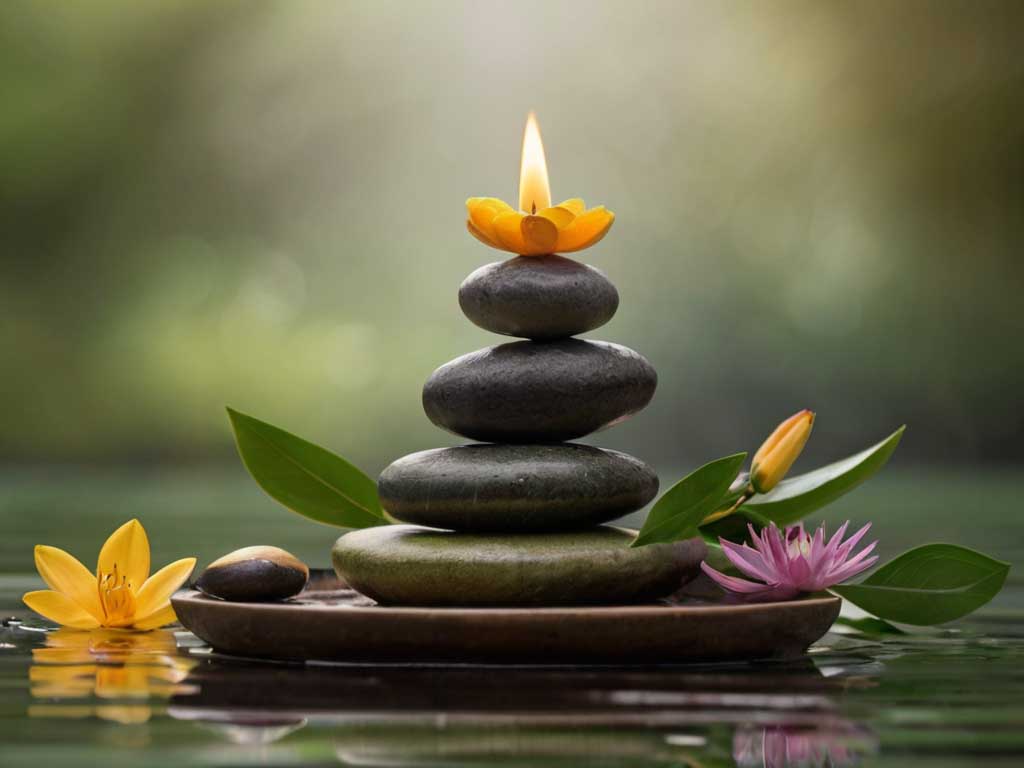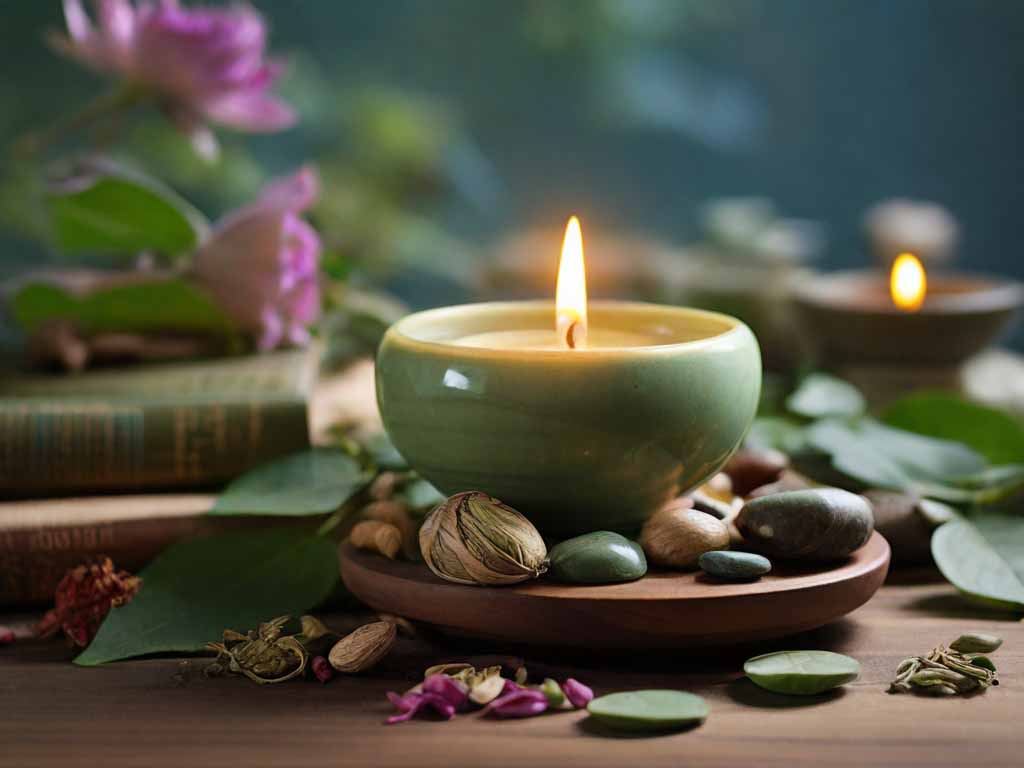
The 5 Pillars of Ayurvedic Self-care: A Holistic Guide to Radiant Well-being
Introduction
In the pursuit of holistic wellness, Ayurveda offers a profound framework known as the Five Pillars of Ayurvedic Self-care. These pillars provide a comprehensive guide to nurturing the mind, body, and spirit, promoting balance and vitality. In this article, we’ll delve into each pillar and explore practical ways to incorporate Ayurvedic self-care into our daily lives.
1. Daily Routine (Dinacharya) for Ayurvedic Self Care
In the realm of Ayurvedic self-care, the cornerstone of a balanced lifestyle lies in the practice of Dinacharya, or the daily routine. This ancient practice emphasizes aligning our activities with the natural rhythms of the day, fostering a sense of harmony and well-being.
At the heart of Dinacharya is the act of rising early, ideally before sunrise, to greet the day with renewed vitality. This early start allows us to attune ourselves to the tranquil energy of the morning, setting a positive tone for the day ahead. Following this, engaging in self-massage, known as abhyanga, becomes a nourishing ritual. Using warm oil suited to our dosha constitution, we gently massage the body, promoting circulation, relaxation, and overall rejuvenation.
Moreover, Dinacharya encourages the incorporation of activities tailored to support our unique doshic balance throughout the day. Whether it’s mindful movement, nourishing meals, or moments of introspection, each activity is thoughtfully chosen to harmonize with our inherent nature.
By embracing Dinacharya, we synchronize our lives with the natural ebb and flow of the universe, fostering physical vitality, mental clarity, and emotional balance. In this way, Ayurvedic self-care becomes not just a routine, but a sacred practice of honouring our connection to the rhythms of nature and the inherent wisdom of our bodies.
2. Nutrition (Ahara) for Ayurvedic Self Care
Ahara, or nutrition, holds a central position in Ayurvedic self-care, recognizing that the food we consume directly influences our physical health, mental clarity, and emotional well-being. At its core, Ayurvedic nutrition advocates for mindful eating practices that honor our unique doshic constitution.
Central to Ayurvedic nutrition is the incorporation of all six tastes—sweet, sour, salty, bitter, pungent, and astringent—in each meal. Each taste carries specific qualities and effects on the body, and consuming a balanced combination helps to maintain equilibrium within the doshas and support optimal digestion.
Moreover, Ayurveda emphasizes the importance of consuming fresh, seasonal, and locally sourced foods whenever possible. These foods are inherently attuned to the environment and carry the vibrancy of nature’s cycles, providing essential nutrients and life force energy to nourish the body and promote overall well-being.
By embracing Ayurvedic principles of nutrition, we cultivate a deeper awareness of the connection between food, health, and vitality. Through mindful eating practices and an emphasis on wholesome, balanced meals, we empower ourselves to support our doshic balance, optimize digestion, and nurture our bodies from within.
3. Sleep (Nidra) for Ayurvedic Self Care
In Ayurveda, sleep, or Nidra, is revered as one of the pillars of health and well-being, essential for rejuvenation and vitality. Quality sleep is considered a sacred time for the body and mind to repair, restore, and replenish.
Ayurveda emphasizes the importance of prioritizing restful sleep by cultivating a calming bedtime routine. This may include activities such as gentle stretching, meditation, or herbal tea consumption to unwind and prepare the body for rest. Avoiding stimulating activities, such as screen time or intense exercise, before bed helps to calm the nervous system and promote relaxation.
Creating a sleep-conducive environment is also paramount in Ayurvedic practice. This involves ensuring that the bedroom is dark, quiet, and free from distractions, allowing for deep and uninterrupted sleep. Additionally, maintaining a consistent sleep schedule aligns with the body’s natural circadian rhythms, further supporting restorative sleep patterns.
Adequate sleep not only rejuvenates the body but also nourishes the mind and spirit, promoting mental clarity, emotional balance, and overall well-being. By honoring the importance of sleep in our daily lives, we can wake up feeling refreshed, energized, and ready to embrace the day ahead.
4. Exercise (Vyayama) for Ayurvedic Self Care
In Ayurveda, exercise, known as Vyayama, is considered an integral aspect of holistic self-care, essential for maintaining physical health, vitality, and overall well-being. Unlike modern approaches that may prioritize intense workouts, Ayurveda advocates for gentle, balancing forms of exercise tailored to individual doshic constitutions.
The focus of Ayurvedic exercise is on promoting harmony and balance within the body, rather than pushing to extremes. By aligning with our unique dosha constitution, we can choose activities that support our physical, mental, and emotional needs. For example, Vata types may benefit from grounding practices like yoga or walking, which help to stabilize the airy and mobile qualities of Vata dosha. Pitta types may find relief and balance through cooling activities like swimming or cycling, which pacify the fiery nature of Pitta. Kapha types may thrive with invigorating practices such as jogging or dancing, which help to stimulate circulation and uplift the heavy qualities of Kapha.
By finding activities that resonate with our individual needs and preferences, we can cultivate strength, flexibility, and overall well-being in a sustainable and balanced way. Embracing the principles of Ayurvedic exercise, we honor the wisdom of our bodies and promote harmony and vitality in our lives.
5. Stress Management (Vihara) for Ayurvedic Self Care
Stress, a common aspect of modern life, can profoundly impact our physical, mental, and emotional well-being, disrupting the body’s natural equilibrium and potentially leading to imbalances in the doshas, the three fundamental energies in Ayurveda. Recognizing the detrimental effects of stress, Ayurveda offers a holistic approach to stress management that addresses its root causes and promotes overall well-being.
Central to Ayurvedic stress management is the cultivation of practices that foster inner peace and resilience. Meditation, a cornerstone of Ayurveda, encourages us to quiet the mind and connect with our inner essence, helping to alleviate stress and promote mental clarity. Breathwork techniques, such as pranayama, harness the power of the breath to calm the nervous system and induce relaxation, supporting our ability to navigate challenging situations with ease. Additionally, mindfulness practices invite us to cultivate present-moment awareness, allowing us to respond to stressors with greater clarity and equanimity.
By integrating these Ayurvedic techniques into our daily lives, we can cultivate a sense of inner peace and resilience that empowers us to navigate life’s challenges with grace and ease. Through consistent practice, we can mitigate the harmful effects of stress, promoting harmony and balance in body, mind, and spirit.
Practical Tips for Incorporating Ayurvedic Self-care
- Create a Daily Routine: Start your day with a few minutes of gentle stretching or meditation, followed by a nourishing breakfast. Plan your meals and activities mindfully, allowing time for rest and relaxation.
- Mindful Eating: Chew your food slowly and savour each bite, paying attention to the flavors and textures. Choose whole, unprocessed foods that support your dosha balance, and avoid eating when stressed or distracted.
- Prioritize Sleep: Establish a regular bedtime routine that promotes relaxation, such as reading a book or taking a warm bath. Create a sleep-friendly environment by keeping your bedroom cool, dark, and quiet.
- Find Joy in Movement: Explore different forms of exercise that resonate with you, whether it’s yoga, dancing, or gardening. Listen to your body and choose activities that feel nourishing and enjoyable.
- Manage Stress: Incorporate stress-reducing practices into your daily routine, such as deep breathing exercises, mindfulness meditation, or spending time in nature. Cultivate a sense of gratitude and perspective, focusing on what you can control and letting go of what you cannot.
Wrap-Up
The Five Pillars of Ayurvedic Self-care provide a holistic framework for promoting balance and vitality in our lives. By incorporating daily routines, mindful eating, restful sleep, regular exercise, and stress management techniques, we can nurture our mind, body, and spirit and cultivate a greater sense of well-being and harmony. Embrace the wisdom of Ayurveda and embark on a journey of self-discovery and transformation.

Ayurvedic Morning Rituals: Practices for a Balanced Start
Embrace Ayurvedic morning rituals for holistic balance. Energize your mind, body, and spirit with ancient practices. Start your day with vitality and well-being for a balanced and harmonious life.

Ayurvedic Self-care: 4 Secrets for Nurturing Mind, Body, and Spirit
Prelude
In the journey of life, nurturing ourselves is not just a luxury—it’s a necessity. Ayurvedic self-care offers a holistic approach to wellness, honouring the interconnectedness of mind, body, and spirit. In this article, we’ll explore the ancient wisdom of Ayurveda and discover practical DIY recipes to nourish ourselves from within.
Understanding Ayurvedic Self-care
Ayurveda, the science of life, teaches us that each individual is unique and requires personalized care to achieve balance and harmony. At the heart of Ayurvedic self-care lies the concept of doshas—Vata, Pitta, and Kapha—energetic forces that govern our physical and mental constitution.
Nurturing the Mind
Nurturing the mind is essential for maintaining balance and well-being in our busy lives. Here are two practices to cultivate inner peace and promote mental clarity:
- Meditation and Mindfulness:
Meditation is a powerful tool for quieting the mind and cultivating inner peace. By practicing meditation regularly, we can reduce stress, improve concentration, and enhance overall well-being. In Ayurveda, meditation is tailored to individual doshic imbalances, allowing us to address specific mental and emotional concerns. Vata types may benefit from grounding meditation practices that focus on stability and grounding, while Pitta types may find relief from cooling and soothing meditations that calm the mind and balance fiery energy. Kapha types may benefit from energizing meditation practices that stimulate mental clarity and uplift the spirit. By incorporating meditation into our daily routine, we can create a sense of inner calm and resilience that supports us in navigating life’s challenges with grace and ease.
- Ayurvedic Herbal Teas:
Herbal teas have been used for centuries in Ayurveda to promote mental clarity, reduce stress, and support overall well-being. Chamomile tea, known for its calming properties, is particularly beneficial for reducing anxiety and promoting relaxation. Tulsi tea, also known as Holy Basil, is revered in Ayurveda for its adaptogenic properties, helping the body and mind adapt to stress and promote mental clarity. Ashwagandha tea, made from the roots of the ashwagandha plant, is prized for its ability to reduce stress, improve sleep quality, and enhance cognitive function. By incorporating these nourishing herbal teas into our daily routine, we can support our mental and emotional health and cultivate a greater sense of balance and well-being.Top of Form
Caring for the Body
Caring for the body is essential for maintaining vitality and well-being. Here are three practices to nourish the body and promote physical health:
- Abhyanga (Self-massage):
Abhyanga, or self-massage, is a rejuvenating practice that involves massaging warm oil into the skin to nourish the body and promote relaxation. In Ayurveda, abhyanga is considered an essential part of daily self-care, helping to improve circulation, soothe muscles, and enhance overall well-being. By incorporating abhyanga into our daily routine, we can nourish the skin, calm the nervous system, and cultivate a greater sense of balance and harmony within the body.
- Balancing Yoga Poses:
Yoga is a powerful practice for promoting physical strength, flexibility, and balance. In Ayurveda, yoga is tailored to individual doshic imbalances, with specific asanas recommended to address each person’s unique needs. Vata types may benefit from grounding and stabilizing poses that promote strength and stability, such as Mountain Pose or Warrior II. Pitta types may find relief from cooling and calming poses that release tension and promote relaxation, such as Forward Fold or Child’s Pose. Kapha types may benefit from energizing and invigorating poses that stimulate circulation and promote vitality, such as Downward Facing Dog or Bridge Pose. By practicing yoga asanas that align with our dosha, we can support our physical health and cultivate a greater sense of balance and well-being.
- Ayurvedic Body Scrub:
Exfoliating the skin is an important part of maintaining healthy skin and promoting circulation. In Ayurveda, body scrubs are often made with natural ingredients like sugar, coconut oil, and essential oils to gently exfoliate and moisturize the skin. A DIY body scrub can be made by combining sugar or salt with coconut oil and adding a few drops of essential oils like lavender or rosemary for added fragrance and therapeutic benefits. By using an Ayurvedic body scrub regularly, we can remove dead skin cells, improve circulation, and leave our skin feeling soft, smooth, and rejuvenated.
Nourishing the Spirit
Nourishing the spirit is essential for fostering inner peace and connection. Here are two practices to cultivate a deeper sense of well-being and vitality:
- Pranayama (Breathwork):
Pranayama, or breathwork, is a powerful practice in yoga and Ayurveda that involves conscious control of the breath to enhance physical, mental, and emotional well-being. By harnessing the power of the breath, we can calm the mind, increase energy, and connect with the essence of life. Pranayama techniques such as deep belly breathing, alternate nostril breathing, and Kapalabhati (skull shining breath) help to balance the doshas, release tension, and promote relaxation. By incorporating pranayama into our daily routine, we can cultivate a greater sense of presence, clarity, and vitality, allowing us to navigate life’s challenges with grace and ease.
- Mindful Eating:
Mindful eating is a practice of bringing awareness and intention to the act of eating, savouring each bite and honouring the nourishment it provides. In Ayurveda, food is viewed as medicine, and mindful eating is an essential part of maintaining balance and vitality. By savouring nourishing meals made from fresh, whole foods, and herbs, we can support digestion, enhance vitality, and cultivate a deeper connection to our bodies and the natural world. Ayurvedic principles of mindful eating include eating in a calm and peaceful environment, chewing food slowly and thoroughly, and paying attention to the tastes, textures, and aromas of each meal. By embracing mindful eating, we can nourish our bodies, minds, and spirits and cultivate a greater sense of well-being and harmony in our lives.Top of Form
DIY Recipes for Ayurvedic Self-care
Ayurvedic Face Mask
Ingredients:
1 tablespoon of chickpea flour
1 teaspoon of turmeric powder
2 tablespoons of yogurt
1 teaspoon of honey
Instructions:
Mix all ingredients in a bowl to form a smooth paste.
Apply to clean, damp face and neck.
Leave on for 15-20 minutes, then rinse with warm water.
Herbal Hair Oil
Ingredients:
1/2 cup of coconut oil
1 tablespoon of fenugreek seeds
1 tablespoon of dried hibiscus flowers
1 tablespoon of amla powder
Instructions:
Heat coconut oil in a saucepan and add fenugreek seeds, hibiscus flowers, and amla powder.
Simmer for 10-15 minutes, then strain.
Massage oil into scalp and hair, leave for an hour, then wash with a gentle shampoo.
Wrap-Up
Ayurvedic self-care is a journey of nurturing and balance, honoring the interconnectedness of mind, body, and spirit. By incorporating ancient wisdom and practical rituals into our daily lives, we can cultivate a deeper sense of well-being and vitality. Embrace the power of Ayurveda to nourish yourself from within and experience true holistic wellness.

Ayurvedic Beauty Rituals: Daily Practices for Rejuvenation and Well-being
Introduction:
In today’s fast-paced world, it is essential to carve out time for self-care and prioritize our well-being. Ayurveda, the ancient Indian system of medicine, offers a wealth of wisdom and practices for enhancing beauty from within. Ayurvedic beauty rituals go beyond external treatments; they emphasize nurturing the mind, body, and spirit to achieve lasting radiance and well-being. In this blog, we will explore a range of Ayurvedic beauty rituals that you can incorporate into your daily routine. From mindful skincare practices to nourishing dietary habits and soothing self-care rituals, these time-honored traditions can help you cultivate a deep sense of rejuvenation and embrace your natural beauty.
Daily Skincare Rituals:
1.1 The Importance of Cleansing and Purifying
As per Ayurvedic Beauty Rituals in Ayurveda, cleansing and purifying the skin are considered foundational steps for maintaining its health and beauty. Cleansing removes dirt, pollutants, and excess oil, while purifying helps to balance the doshas (bioenergetic forces) and promote a clear complexion. Ayurvedic cleansing emphasizes gentle, natural ingredients that cleanse without stripping the skin’s natural oils.
1.2 Ayurvedic Face Cleansing Techniques
Ayurveda offers various face cleansing techniques that not only cleanse but also promote circulation and relaxation. These include:
Oil Cleansing Method: Using a specific blend of oils, such as sesame or almond, to gently massage the face and dissolve impurities.
Ubtan: A herbal paste made with ingredients like chickpea flour, turmeric, and rosewater, used for deep cleansing and exfoliation.
Herbal Steam: Inhaling steam infused with Ayurvedic herbs like neem, tulsi, or rosemary to open pores and remove toxins.
1.3 Nourishing and Hydrating with Herbal Infusions
Ayurvedic Beauty Rituals emphasizes nourishing and hydrating the skin from within. Herbal infusions, known as “teas,” are an excellent way to support skin health. Some popular Ayurvedic herbs for skin include neem, turmeric, rose, and chamomile. Infuse these herbs in hot water, allow the mixture to cool, and use it as a toner or facial mist to provide hydration and nutrients to the skin.
1.4 Ayurvedic Facial Massage for Rejuvenation
As per Ayurvedic Beauty Rituals Facial massage is an integral part of Ayurvedic skincare. It promotes circulation, lymphatic drainage, and relaxation, while also stimulating the marma points (vital energy points) on the face. Using a nourishing oil, such as almond or rosehip, gently massage the face in upward and circular motions. This practice enhances the skin’s natural glow, improves elasticity, and reduces tension in facial muscles.
1.5 Nighttime Skincare Rituals for Restoration
Nighttime is an optimal time for skin restoration and rejuvenation. Ayurveda suggests the following rituals to support the skin’s repair process:
Cleansing: Use a gentle cleanser or an oil-based cleanser to remove impurities accumulated throughout the day.
Hydration: Apply a nourishing night cream or facial oil to replenish moisture and support overnight healing.
Beauty Sleep: Prioritize quality sleep to allow the body and skin to rest, rejuvenate, and repair.
Incorporating these Ayurvedic skincare rituals into your daily routine can help restore balance, nourish your skin, and promote a radiant complexion. Remember to choose products and techniques that align with your unique skin type and consult an Ayurvedic practitioner for personalized recommendations. Embrace these daily rituals as a form of self-care and enjoy the transformative effects on your skin and overall well-being.
Nurturing Dietary Habits for Beauty:
2.1 The Role of Diet in Ayurvedic Beauty
Ayurveda recognizes the profound impact of diet on our overall health and well-being, including the health and radiance of our skin. A balanced and nourishing diet is essential for promoting beauty from within. What we eat directly affects the quality of our skin, as well as our digestion, metabolism, and the balance of doshas (bioenergetic forces) in our body.
2.2 Ayurvedic Principles of Balanced Nutrition
In Ayurveda, balanced nutrition involves incorporating all six tastes (sweet, sour, salty, bitter, pungent, and astringent) in our meals to satisfy our senses and support optimal digestion. It also emphasizes eating fresh, seasonal, and whole foods that are appropriate for our individual constitution (dosha) and the current state of balance or imbalance.
2.3 Beauty-Enhancing Foods and Herbs
Ayurveda offers a wide array of beauty-enhancing foods and herbs that nourish the skin and promote a radiant complexion. Some examples include:
Triphala: A blend of three fruits (amalaki, bibhitaki, haritaki) known for their detoxifying and rejuvenating properties.
Turmeric: A potent anti-inflammatory spice that promotes skin healing and helps maintain a healthy glow.
Aloe Vera: A cooling and hydrating herb that soothes inflammation and supports skin regeneration.
Ghee: Clarified butter with nourishing properties that helps moisturize and enhance the natural luster of the skin.
Fresh fruits and vegetables: Rich in antioxidants, vitamins, and minerals that support skin health and protect against free radicals.
2.4 Hydration for Healthy and Glowing Skin
Adequate hydration is crucial for maintaining healthy and glowing skin. Ayurveda recommends drinking pure, filtered water throughout the day to keep the body and skin hydrated. Additionally, herbal teas and infusions made with skin-nourishing herbs like rose, hibiscus, or mint can provide additional hydration and antioxidant benefits.
2.5 Ayurvedic Detoxification Practices
Ayurvedic detoxification practices, known as Panchakarma, play a significant role in promoting beauty and overall well-being. These practices help eliminate toxins, balance the doshas, and rejuvenate the body and mind. Some Ayurvedic detoxification practices that support healthy skin include:
Abhyanga: Self-massage with herbal oils to stimulate lymphatic flow and remove toxins.
Ayurvedic herbal teas or decoctions: Specially formulated blends to support the body’s natural detoxification processes.
Triphala supplementation: Triphala is often used as a gentle herbal supplement to promote internal cleansing and improve digestion.
By embracing nourishing dietary habits and incorporating Ayurvedic beauty-enhancing foods, herbs, and detoxification practices into your lifestyle, you can support your skin’s health, radiance, and natural beauty from the inside out. Remember to consult with an Ayurvedic practitioner to determine the most suitable dietary recommendations and detoxification practices for your unique needs.
Mindful Self-Care Rituals:
3.1 Daily Ayurvedic Oil Massage (Abhyanga)
One of the most cherished Ayurvedic self-care rituals is the practice of daily oil massage, known as Abhyanga. This soothing and nourishing massage not only benefits the physical body but also calms the mind and nurtures the spirit. Using warm, herbal-infused oils, gently massage your entire body in long, sweeping strokes before bathing or showering. This ritual helps promote circulation, relieves stress, lubricates the joints, and leaves your skin soft, supple, and radiant.
3.2 Enhancing Beauty with Meditation and Breathing Exercises
Inner peace and harmony reflect on the outside, and practicing meditation and breathing exercises can enhance your beauty from within. Taking a few moments each day to sit in stillness, focus on your breath, and cultivate a peaceful state of mind can have a profound impact on your overall well-being and radiance. Deep breathing exercises, such as Nadi Shodhana (alternate nostril breathing), can help balance the doshas and bring a sense of calm and clarity.
3.3 Practicing Mindful Eating for Beauty and Digestion
In Ayurveda, the way we eat is as important as what we eat. Mindful eating is a practice that involves being fully present and aware while enjoying your meals. Take time to savor each bite, chew your food thoroughly, and cultivate gratitude for the nourishment it provides. Eating in a calm and relaxed environment, free from distractions, supports optimal digestion and assimilation of nutrients, leading to healthier and more radiant skin.
3.4 Restful Sleep and Ayurvedic Bedtime Rituals
Getting enough restful sleep is essential for maintaining vibrant skin and overall well-being. Establishing a consistent bedtime routine can signal your body and mind that it’s time to unwind and prepare for deep, rejuvenating sleep. Ayurvedic bedtime rituals may include gentle stretching, meditation, sipping herbal tea, and applying calming essential oils like lavender to promote relaxation. Creating a peaceful sleep environment, free from electronic devices and stimulating activities, can also enhance the quality of your rest.
3.5 Embracing Inner Beauty with Positive Affirmations
Beauty is not solely external; it also stems from a deep sense of self-love and acceptance. Embrace your inner beauty by incorporating positive affirmations into your daily routine. Affirmations are powerful statements that help shift your mindset and cultivate self-esteem. Choose affirmations that resonate with you, such as “I am beautiful inside and out” or “I radiate confidence and joy,” and repeat them silently or aloud with conviction. These affirmations can uplift your spirit, boost your self-confidence, and enhance your natural beauty.
By incorporating these mindful self-care rituals into your daily life, you can nurture your physical, mental, and emotional well-being, which radiates through your skin and enhances your natural beauty. Embrace these practices with intention, consistency, and self-love, and watch as they transform not only your external appearance but also your overall sense of well-being and inner radiance.
Ayurvedic Hair Care Rituals:
4.1 Scalp and Hair Oil Massage for Nourishment
Ayurvedic Beauty Rituals states nurturing your hair and scalp with regular oil massages is a vital Ayurvedic hair care ritual. Use warm herbal-infused oils, such as coconut, sesame, or Brahmi oil, and gently massage them into your scalp in circular motions. This practice promotes blood circulation, nourishes the hair follicles, and strengthens the roots. It also helps to calm the mind and release stress, contributing to healthier and lustrous hair.
4.2 Natural Hair Cleansing with Ayurvedic Herbs
Ayurvedic Beauty Rituals offers natural alternatives to harsh chemical shampoos that can strip the hair of its natural oils. Ayurvedic herbs like Shikakai, Reetha, and Amla have been used for centuries to cleanse and nourish the hair. These herbs can be mixed with water or herbal infusions to create a gentle and effective hair cleanser. They cleanse the scalp, remove excess oil and impurities, and promote shiny and healthy-looking hair.
4.3 Strengthening and Conditioning with Herbal Hair Masks
Herbal hair masks are an excellent way to strengthen and condition your hair naturally. Ayurvedic herbs like Brahmi, Bhringraj, and Hibiscus can be ground into a powder and mixed with yogurt, aloe vera gel, or coconut milk to create nourishing hair masks. Apply the mask to your hair and scalp, leave it on for 30 minutes to an hour, and rinse thoroughly. These herbal masks provide deep nourishment, promote hair growth, and enhance the overall health and vitality of your hair.
4.4 Balancing Pitta, Vata, and Kapha Doshas for Healthy Hair
Ayurvedic Beauty Rituals recognizes the importance of balancing the doshas (Pitta, Vata, and Kapha) for maintaining healthy hair. Each dosha has specific hair care needs, and understanding your predominant dosha can help you choose the right hair care practices and products. For example, cooling and calming practices are beneficial for Pitta hair types, while nourishing and moisturizing treatments are ideal for Vata hair types. Kapha hair types benefit from stimulating and invigorating practices. By balancing the doshas through personalized hair care, you can promote healthy, vibrant, and well-nourished hair.
Incorporating these Ayurvedic hair care rituals into your routine can transform your hair health and enhance its natural beauty. Embrace the power of scalp and hair oil massages, natural hair cleansers, herbal hair masks, and personalized dosha-balancing practices to nurture and nourish your hair from root to tip. Discover the joy of healthy, lustrous, and radiant hair through the wisdom of Ayurveda.
Holistic Beauty from Within:
5.1 Embracing Ayurvedic Beauty Beyond External Appearance
True beauty goes beyond external appearance and encompasses overall well-being. Ayurveda teaches us to embrace beauty from within by nurturing our physical, mental, and emotional health. When we prioritize self-care, cultivate positive relationships, and engage in practices that promote balance and harmony, our inner radiance shines through, enhancing our overall beauty.
5.2 Cultivating Emotional Well-being for Radiant Beauty
Emotional well-being plays a significant role in our overall beauty. Ayurveda emphasizes the connection between our emotions and our physical appearance. By cultivating emotional balance through practices like mindfulness, self-reflection, and stress management, we can promote a radiant and harmonious beauty that comes from within.
5.3 Practicing Yoga and Movement for Inner Balance
Yoga and movement practices not only benefit our physical health but also contribute to our inner balance and beauty. Regular yoga practice helps release physical tension, calms the mind, and improves energy flow throughout the body. Movement practices like dance, tai chi, or walking in nature also bring harmony to our body, mind, and spirit, enhancing our natural beauty.
5.4 Harnessing the Power of Ayurvedic Herbs for Inner Radiance
Ayurvedic herbs are not only beneficial for external beauty but also have a profound impact on our inner radiance. Herbs like Ashwagandha, Tulsi, and Shatavari help promote vitality, boost immunity, and balance our body’s systems, leading to a vibrant and radiant appearance. Incorporating these herbs into our daily routine, whether in teas, herbal supplements, or culinary preparations, can support our overall well-being and enhance our inner beauty.
5.5 Aligning with Nature’s Rhythms for Beauty and Well-being
Nature operates in rhythmic cycles, and aligning with these natural rhythms can enhance our beauty and well-being. Ayurveda encourages us to synchronize our daily routine, including sleep, meals, and activities, with the natural rhythms of the day. By honoring these rhythms, we create a sense of harmony within ourselves and with the environment, allowing our beauty to flourish from the inside out.
By embracing holistic beauty practices that go beyond external appearance, we can nourish our body, mind, and spirit, and radiate a natural and authentic beauty. Cultivating emotional well-being, practicing yoga and movement, harnessing the power of Ayurvedic herbs, and aligning with nature’s rhythms are powerful ways to enhance our inner radiance and experience holistic beauty that is truly transformative.
Conclusion:
Incorporating Ayurvedic beauty rituals into your daily routine can be a transformative journey towards holistic well-being. By embracing mindful skincare practices, nurturing dietary habits, and engaging in soothing self-care rituals, you can unlock the timeless wisdom of Ayurveda and cultivate a radiant and balanced beauty that emanates from within. Remember, Ayurvedic beauty is not about achieving perfection but rather nurturing and honoring your unique beauty. So, take a step towards embracing these ancient practices, and let the transformative power of Ayurveda guide you on a path of rejuvenation, self-care, and well-being.
